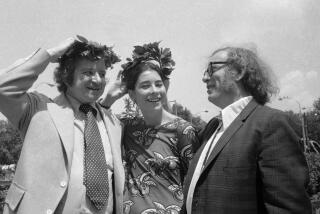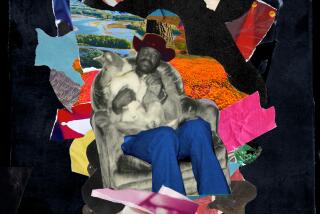William Warfield, 82; Baritone Found Success on Stage, Screen
- Share via
William Warfield, the esteemed American baritone who sang “Ol’ Man River” in the 1951 MGM film version of Jerome Kern’s “Show Boat,” has died. He was 82.
Warfield died Sunday at the Rehabilitation Institute of Chicago where he had been recuperating from a fall late last month, according to his brother, Thaddeus Warfield. An autopsy will be performed.
Possessed of a warm, honeyed baritone capable of great dramatic urgency, Warfield made the parts of Joe the dockhand in “Show Boat” and Porgy in George Gershwin’s “Porgy and Bess” virtual signature roles in a long career that continued until this July when he sang a recital at Harvard University.
The oldest of a Baptist preacher’s five sons, Warfield was born in West Helena, Ark., on Jan. 22, 1920. Seeking better educational and employment opportunities, his father, Robert E. Warfield, soon moved the family to Rochester, N.Y.
During Warfield’s senior year in high school, he won top honors at both the regional and national finals of the National Music Educators League Competition.
With a first-place award of a scholarship to the American music school of his choice in hand, Warfield entered the Eastman School of Music of the University of Rochester, where he earned his bachelor’s in 1942. After four years in the Army’s military intelligence division during World War II, he returned to Eastman for a master’s.
Warfield originally planned to become a music teacher, not a singer. But, encouraged by groundbreaking African American vocal artists, contralto Marian Anderson and bass Paul Robeson, he began focusing on his vocal and dramatic training. He sang in the national touring company of Harold Rome’s 1947 Broadway musical “Call Me Mister,” then two years later went on to create the role of Cal in the original Broadway cast of Marc Blitzstein’s opera “Regina.”
He made his Town Hall recital debut in 1950, receiving critical raves that propelled his career forward as a concert singer. For major opera careers, African American singers had to wait until 1955 when Anderson broke the color barrier at the Metropolitan in New York. By that time, however, Warfield’s oratorio and stage career was soaring.
In 1952, he was signed to sing Porgy opposite soprano Leontyne Price’s Bess in a European tour sponsored by the U.S. State Department. The two married in 1952, but separated six years later and, citing the demands of disparate careers, divorced in 1972.
During the 1950s, Warfield recorded frequently, toured as a soloist with the Philadelphia Orchestra and appeared as De Lawd on NBC’s Hallmark Hall of Fame presentation of Marc Connelly’s “Green Pastures.” He gave the world premiere of the second set of Copland’s “Old American Songs,” with the composer as pianist, in 1953.
In the 1960s and ‘70s, Warfield revived his signature roles in “Show Boat” and “Porgy and Bess” in New York, Vienna, Puerto Rico, Athens, Geneva and other cities.
In 1974, he was appointed a professor of music at the University of Illinois.
He also received honorary doctorates from the University of Arkansas in 1972, Lafayette College in 1977, Boston University in 1982, Augustana College in 1983 and James Milliken University in 1984. He became a professor at Northwestern University in 1984.
In 1984, he also won a Grammy in the spoken word category for his narration of Copland’s “A Lincoln Portrait,” a role he performed often and reprised in 2001 at the Hollywood Bowl with conductor John Mauceri and the Hollywood Bowl Orchestra.
Warfield had also been prominent in the Pacific Symphony’s eight-day Copland Centenary Festival in Costa Mesa in 2000.
He was president of the National Assn. of Negro Musicians from 1985 to 1990 and published his memoirs, “William Warfield: My Music & My Life,” in 1991.
He is survived by two brothers.
More to Read
The biggest entertainment stories
Get our big stories about Hollywood, film, television, music, arts, culture and more right in your inbox as soon as they publish.
You may occasionally receive promotional content from the Los Angeles Times.










